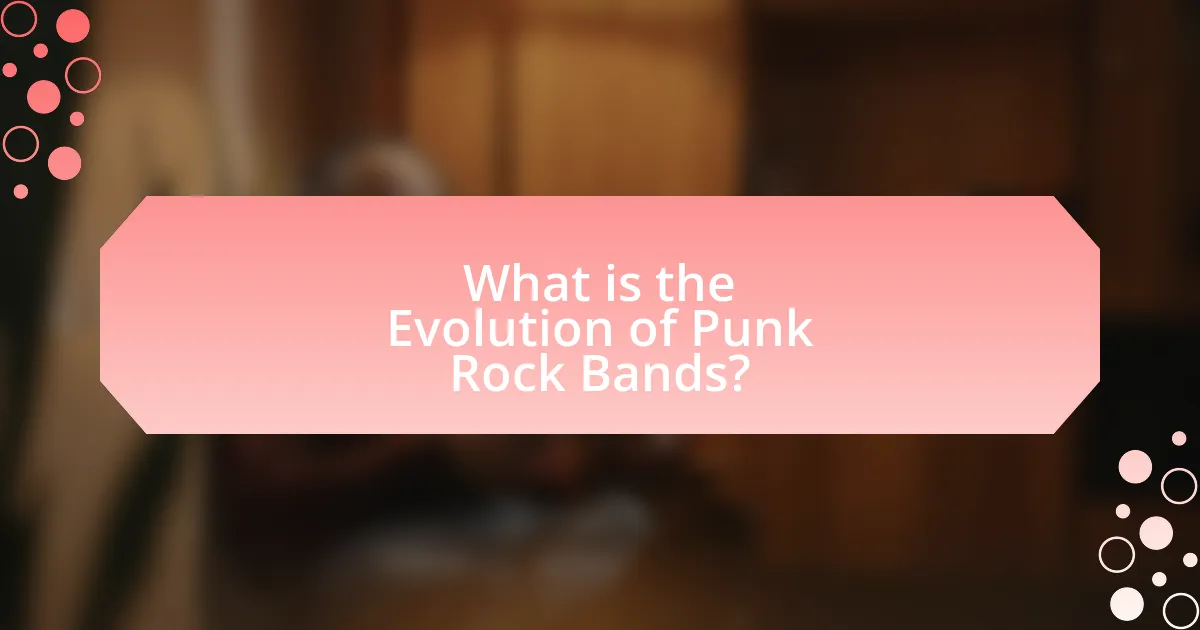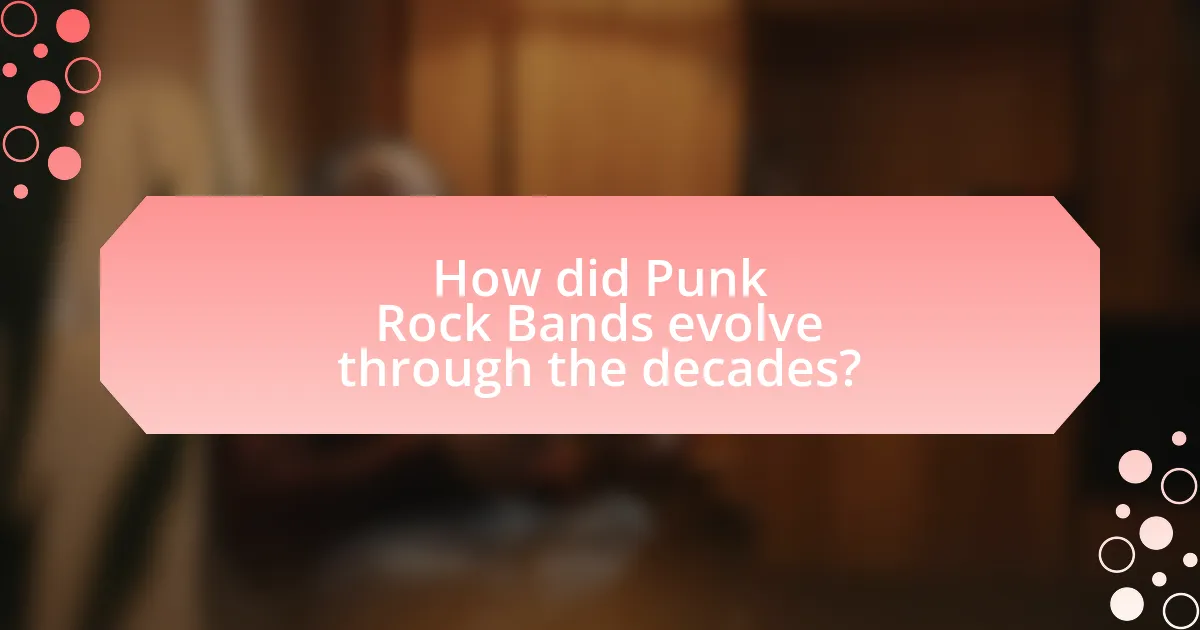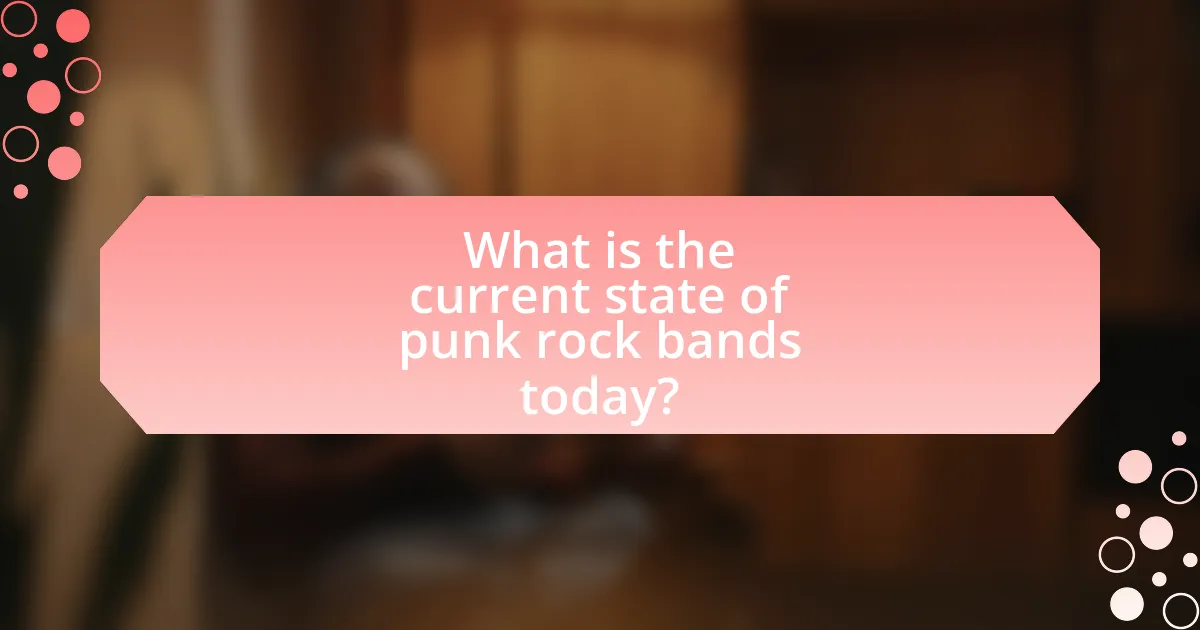The article provides a historical overview of the evolution of punk rock bands, tracing their origins from the mid-1970s to the present day. It highlights the genre’s foundational bands, such as the Ramones and Sex Pistols, and discusses the diversification of punk into subgenres like hardcore punk and pop-punk. The article examines the cultural and social factors that influenced punk rock’s emergence, the defining characteristics of the genre, and the impact of political movements and technology on its development. Additionally, it addresses the current state of punk rock, the challenges faced by modern bands, and the importance of maintaining the genre’s core ethos in a contemporary context.

What is the Evolution of Punk Rock Bands?
The evolution of punk rock bands began in the mid-1970s, characterized by a raw, energetic sound and a DIY ethos. Early bands like the Ramones and Sex Pistols laid the groundwork for the genre, emphasizing simplicity and rebellion against mainstream music. By the late 1970s and early 1980s, punk diversified into subgenres such as hardcore punk, with bands like Black Flag and Minor Threat, which intensified the sound and message. The 1990s saw the rise of pop-punk bands like Green Day and Blink-182, bringing punk into the mainstream while maintaining its core values of anti-establishment and individuality. This evolution reflects a continuous adaptation of punk rock, influencing various music styles and cultures globally, as evidenced by the genre’s enduring presence in contemporary music scenes.
How did punk rock music originate?
Punk rock music originated in the mid-1970s as a reaction against the perceived excesses of mainstream rock music. This genre emerged primarily in the United States and the United Kingdom, characterized by its fast tempos, simple chords, and raw sound. Key bands such as the Ramones in New York and the Sex Pistols in London played pivotal roles in shaping the punk rock movement, emphasizing a DIY ethic and often addressing social and political issues in their lyrics. The genre’s roots can be traced back to garage rock and protopunk bands of the 1960s, which laid the groundwork for punk’s rebellious spirit and musical style.
What cultural and social factors influenced the birth of punk rock?
The birth of punk rock was influenced by cultural and social factors such as economic decline, political disillusionment, and a reaction against mainstream music. In the 1970s, cities like New York and London faced high unemployment rates and social unrest, which fueled a sense of rebellion among youth. This discontent was reflected in the raw, aggressive sound of punk rock, characterized by its DIY ethic and anti-establishment lyrics. Bands like the Ramones and the Sex Pistols emerged as voices of this disillusionment, rejecting the polished production of mainstream rock in favor of a more authentic and visceral musical experience. The punk movement also drew inspiration from earlier countercultural movements, such as the Beat Generation and the hippie movement, which emphasized individualism and nonconformity.
Who were the pioneering bands that shaped the early punk scene?
The pioneering bands that shaped the early punk scene include the Ramones, Sex Pistols, and The Clash. The Ramones, formed in 1974 in New York City, are often credited with defining the punk sound through their fast tempos and simple, catchy melodies. The Sex Pistols, emerging in the mid-1970s in London, brought a raw, rebellious attitude to punk music, exemplified by their iconic album “Never Mind the Bollocks, Here’s the Sex Pistols.” The Clash, also from London, blended punk with reggae and rockabilly, influencing the genre’s evolution with their politically charged lyrics and diverse musical styles. These bands collectively laid the groundwork for punk rock, influencing countless artists and shaping the cultural landscape of the late 20th century.
What are the defining characteristics of punk rock music?
Punk rock music is characterized by its fast tempos, aggressive guitar riffs, and raw, unpolished sound. This genre emerged in the mid-1970s as a reaction against the perceived excesses of mainstream rock music, emphasizing simplicity and directness in both musical composition and lyrical content. Punk rock often features short song durations, typically under three minutes, and lyrics that address social and political issues, reflecting a rebellious attitude. Bands like the Ramones and Sex Pistols exemplified these traits, with their straightforward musical style and confrontational lyrics, which contributed to the genre’s identity and cultural significance.
How do punk rock lyrics reflect the genre’s ethos?
Punk rock lyrics reflect the genre’s ethos by emphasizing themes of rebellion, anti-establishment sentiments, and individualism. These lyrics often critique societal norms, political systems, and consumer culture, showcasing a raw and unfiltered expression of frustration and discontent. For example, songs like “Anarchy in the U.K.” by the Sex Pistols encapsulate the genre’s disdain for authority and the desire for freedom, illustrating the punk rock commitment to challenging the status quo. This lyrical content aligns with the historical context of the late 1970s, where punk emerged as a response to economic hardship and social unrest, further validating the connection between the lyrics and the genre’s core values.
What musical elements distinguish punk rock from other genres?
Punk rock is distinguished from other genres primarily by its fast tempos, aggressive guitar riffs, and straightforward song structures. These elements create a raw and energetic sound that contrasts with the complexity often found in genres like progressive rock or pop. Punk rock typically features short songs, often under three minutes, with a focus on simplicity and directness in both lyrics and instrumentation. The genre also emphasizes a DIY ethic, with many bands self-producing their music and maintaining control over their artistic direction, which further sets it apart from mainstream music practices.
Why is the historical context important in understanding punk rock’s evolution?
The historical context is crucial for understanding punk rock’s evolution because it provides insight into the social, political, and economic conditions that shaped the genre. Punk rock emerged in the 1970s as a response to disillusionment with mainstream culture, particularly in the United States and the United Kingdom, where economic downturns and political unrest were prevalent. For instance, the rise of unemployment and the dissatisfaction with government policies during this period fueled a rebellious spirit among youth, which punk rock embodied through its raw sound and anti-establishment lyrics. This context explains why bands like the Sex Pistols and The Ramones resonated with audiences, as they articulated the frustrations of a generation facing societal challenges. Understanding these historical factors allows for a deeper appreciation of punk rock’s themes and its lasting impact on music and culture.
How did political movements impact the development of punk rock?
Political movements significantly influenced the development of punk rock by providing a backdrop of social unrest and dissent that the genre embodied. The emergence of punk rock in the 1970s coincided with various political upheavals, including anti-establishment sentiments, civil rights movements, and opposition to the Vietnam War. Bands like The Clash and Dead Kennedys incorporated political themes into their lyrics, addressing issues such as government corruption, social inequality, and war. The punk ethos of rebellion and nonconformity resonated with youth disillusioned by mainstream culture and politics, making punk a voice for marginalized groups. This connection to political movements not only shaped the sound and style of punk rock but also solidified its role as a form of protest music, reflecting the frustrations and aspirations of a generation.
What role did technology play in the spread of punk rock music?
Technology played a crucial role in the spread of punk rock music by facilitating the production, distribution, and promotion of music. The advent of affordable recording equipment in the 1970s allowed punk bands to produce their music independently, bypassing traditional record labels. This democratization of music production led to the emergence of numerous punk bands, as seen with the rise of DIY labels like SST Records and Dischord Records. Additionally, the proliferation of cassette tapes enabled bands to share their music widely, fostering a grassroots movement that connected fans and musicians across geographical boundaries. The use of the internet in the late 1990s and early 2000s further amplified this effect, allowing for instant access to music and the formation of online communities that supported punk culture.

How did Punk Rock Bands evolve through the decades?
Punk rock bands evolved significantly through the decades, transitioning from raw, rebellious sounds in the 1970s to diverse subgenres and mainstream acceptance by the 2000s. In the 1970s, bands like the Ramones and Sex Pistols defined punk with fast tempos and anti-establishment lyrics, reflecting societal discontent. The 1980s saw the emergence of hardcore punk, with bands like Black Flag and Minor Threat emphasizing speed and aggression, while also influencing the development of alternative rock. By the 1990s, punk rock diversified into pop-punk with bands like Green Day and Blink-182 achieving commercial success, bringing punk aesthetics to a broader audience. In the 2000s and beyond, punk rock incorporated elements from various genres, leading to bands like My Chemical Romance and Fall Out Boy, who blended punk with emo and pop influences, showcasing the genre’s adaptability and enduring relevance in contemporary music.
What were the key phases in the evolution of punk rock bands?
The key phases in the evolution of punk rock bands include the early formation in the mid-1970s, the mainstream breakthrough in the late 1970s, the diversification in the 1980s, and the resurgence in the 1990s. The early formation phase featured bands like the Ramones and the Sex Pistols, who established the raw sound and anti-establishment ethos of punk. The mainstream breakthrough saw bands like The Clash and Blondie achieving commercial success, bringing punk into the broader music scene. In the 1980s, punk diversified into subgenres such as hardcore punk and pop-punk, with bands like Black Flag and Green Day emerging. The resurgence in the 1990s was marked by a renewed interest in punk, influenced by bands like Rancid and The Offspring, which helped to revitalize the genre and introduce it to a new generation.
How did the 1970s shape the identity of punk rock bands?
The 1970s significantly shaped the identity of punk rock bands by fostering a rebellious ethos and a DIY (do-it-yourself) culture that rejected mainstream music conventions. This era saw the emergence of bands like the Ramones, Sex Pistols, and The Clash, who embraced raw sound, anti-establishment lyrics, and a distinctive fashion style characterized by leather jackets and ripped jeans. The socio-political climate, marked by economic downturns and disillusionment with authority, influenced the punk movement, leading to a sense of urgency and authenticity in their music. The punk rock scene also thrived in underground venues, which reinforced the community aspect and the idea of self-production, allowing bands to maintain creative control over their work.
What changes occurred in the punk rock scene during the 1980s?
During the 1980s, the punk rock scene experienced significant changes characterized by a shift towards mainstream acceptance and diversification of musical styles. This era saw the emergence of subgenres such as hardcore punk, which emphasized faster tempos and aggressive lyrics, exemplified by bands like Black Flag and Minor Threat. Additionally, the commercialization of punk was evident as bands like The Clash and Green Day gained commercial success, leading to a broader audience and influence on popular music. The decade also marked the rise of punk-influenced alternative rock, with bands like R.E.M. and The Cure incorporating punk elements into their sound, further blurring the lines between punk and mainstream music.
How did punk rock bands adapt to changing musical landscapes?
Punk rock bands adapted to changing musical landscapes by incorporating diverse influences and evolving their sound while maintaining their core ethos. For instance, bands like Green Day and The Offspring integrated elements of pop and alternative rock in the 1990s, which helped them achieve mainstream success without losing their punk identity. Additionally, the rise of digital platforms allowed punk bands to reach wider audiences and experiment with new styles, as seen with bands like Paramore, who blended punk with pop and electronic influences. This adaptability has been crucial for their longevity in a rapidly changing music industry.
What influences did other genres have on punk rock bands over time?
Punk rock bands have been significantly influenced by various genres over time, including garage rock, rock and roll, reggae, and even heavy metal. Garage rock, characterized by its raw sound and DIY ethos, laid the groundwork for punk’s rebellious spirit, as seen in bands like The Stooges and The Ramones. Reggae introduced elements of rhythm and social commentary, which can be observed in the works of bands like The Clash, who incorporated reggae beats into their music. Additionally, heavy metal’s aggressive guitar riffs and energy influenced punk’s sound, particularly in the emergence of subgenres like hardcore punk. These influences demonstrate how punk rock evolved by integrating diverse musical elements while maintaining its core ethos of rebellion and authenticity.
How did the commercialization of punk rock affect its authenticity?
The commercialization of punk rock significantly diminished its authenticity by transforming its raw, anti-establishment ethos into a marketable product. Initially, punk rock emerged as a grassroots movement characterized by its rebellion against mainstream culture and music industry norms. However, as major record labels began to sign punk bands in the late 1970s and early 1980s, the genre became commodified, leading to a dilution of its original message. For instance, bands like The Sex Pistols and Green Day, while initially embodying punk’s rebellious spirit, faced criticism for their commercial success, which some fans viewed as a betrayal of punk’s core values. This shift resulted in a paradox where the very elements that defined punk—such as DIY ethics and anti-commercialism—were overshadowed by commercial interests, ultimately altering the perception of authenticity within the genre.
What are some notable punk rock bands from different eras?
Notable punk rock bands from different eras include The Ramones from the 1970s, known for their fast tempos and simple melodies, and Green Day from the 1990s, which brought punk rock to mainstream audiences with their album “Dookie.” In the 2000s, bands like My Chemical Romance emerged, blending punk with emo influences, while in the 2010s, groups such as PUP revitalized the genre with a modern sound. Each of these bands significantly impacted the punk rock scene during their respective eras, shaping its evolution and popularity.
How did bands like The Ramones and Green Day contribute to punk rock’s legacy?
The Ramones and Green Day significantly contributed to punk rock’s legacy by shaping its sound, style, and cultural impact. The Ramones, emerging in the 1970s, established the fast-paced, stripped-down sound that defined punk rock, influencing countless bands with their simple chord progressions and catchy melodies. Their self-titled debut album in 1976 is often credited as one of the first punk rock albums, setting a template for the genre.
Green Day revitalized punk rock in the 1990s with their mainstream breakthrough album “Dookie,” released in 1994, which sold over 10 million copies in the U.S. alone. This album brought punk rock to a wider audience and introduced themes of youth disillusionment and rebellion, resonating with a new generation. Both bands helped solidify punk rock’s place in music history, with The Ramones laying the groundwork and Green Day expanding its reach and relevance in popular culture.
What impact did female punk rock bands have on the genre?
Female punk rock bands significantly influenced the genre by challenging gender norms and expanding the thematic scope of punk music. Bands like The Runaways and The Slits introduced a female perspective that addressed issues such as sexism, identity, and empowerment, which were often overlooked in a male-dominated scene. Their presence not only inspired future generations of female musicians but also encouraged a more inclusive environment within punk, leading to a diversification of voices and styles. The impact is evident in the rise of subsequent female-led bands in the 1990s and beyond, such as Bikini Kill and Sleater-Kinney, who further pushed feminist themes and DIY ethics, solidifying the role of women in punk rock history.

What is the current state of punk rock bands today?
The current state of punk rock bands today is characterized by a diverse range of styles and a resurgence of interest in the genre. Many contemporary punk bands, such as Idles and Turnstile, blend traditional punk elements with influences from other genres, reflecting a broader musical landscape. Additionally, the rise of digital platforms has enabled underground and independent punk bands to reach wider audiences, with streaming services and social media playing crucial roles in their promotion. According to a 2022 report by the International Federation of the Phonographic Industry, punk rock has seen a 15% increase in streaming numbers, indicating a growing listener base. This evolution showcases punk rock’s adaptability and continued relevance in modern music culture.
How has the punk rock scene changed in the 21st century?
The punk rock scene has evolved significantly in the 21st century, characterized by a diversification of musical styles and the rise of digital platforms for distribution. Traditional punk’s raw sound has blended with genres like pop, electronic, and hip-hop, leading to a broader range of influences in contemporary punk music. Additionally, the accessibility of social media and streaming services has allowed new bands to reach audiences without the need for major label support, resulting in a more democratized music landscape. For instance, bands like Paramore and Fall Out Boy have incorporated pop elements, while artists like Billie Eilish have drawn from punk aesthetics, showcasing the genre’s adaptability. This shift reflects a departure from the original punk ethos, as the scene now embraces a wider array of cultural and musical expressions.
What new subgenres have emerged within punk rock?
New subgenres that have emerged within punk rock include pop-punk, post-punk, and hardcore punk. Pop-punk blends catchy melodies with punk’s raw energy, gaining mainstream popularity in the 1990s with bands like Green Day and Blink-182. Post-punk, which developed in the late 1970s, incorporates experimental sounds and influences from other genres, exemplified by bands like Joy Division and The Cure. Hardcore punk, characterized by its faster tempos and aggressive sound, emerged in the early 1980s with bands such as Black Flag and Minor Threat, pushing the boundaries of punk’s intensity. These subgenres illustrate the diversity and evolution of punk rock, reflecting its adaptability and influence on various musical landscapes.
How are modern punk rock bands addressing contemporary issues?
Modern punk rock bands are addressing contemporary issues by incorporating themes of social justice, political activism, and mental health into their music and lyrics. For instance, bands like Anti-Flag and Rise Against tackle topics such as climate change, systemic racism, and LGBTQ+ rights, reflecting the urgent societal challenges of today. Their songs often serve as a rallying cry for activism, encouraging listeners to engage with these pressing issues. Additionally, the rise of digital platforms allows these bands to reach wider audiences, amplifying their messages and fostering community engagement around contemporary concerns.
What challenges do punk rock bands face in today’s music industry?
Punk rock bands face significant challenges in today’s music industry, primarily due to the oversaturation of the market and the decline of traditional revenue streams. The music industry has become highly competitive, with thousands of new artists emerging daily, making it difficult for punk rock bands to stand out. Additionally, the shift from physical album sales to streaming services has reduced income for many musicians, as streaming platforms typically pay artists a fraction of a cent per stream. According to a 2021 report by the Recording Industry Association of America, streaming accounted for 83% of the music industry’s revenue, yet many punk bands struggle to monetize their music effectively through these platforms. Furthermore, the COVID-19 pandemic has exacerbated these challenges by limiting live performances, which are crucial for punk rock bands to connect with fans and generate income.
How do streaming platforms affect the reach of punk rock bands?
Streaming platforms significantly enhance the reach of punk rock bands by providing global accessibility to their music. These platforms, such as Spotify and Apple Music, allow punk rock bands to distribute their music widely without the need for traditional record labels, which often limited exposure. For instance, a study by the International Federation of the Phonographic Industry (IFPI) in 2021 indicated that over 400 million people globally use streaming services, creating a vast audience for independent artists. Additionally, streaming algorithms can promote lesser-known punk bands alongside popular tracks, increasing their visibility and potential fan base. This democratization of music distribution has led to a resurgence in the punk rock genre, allowing bands to connect with audiences that may not have been reachable through conventional means.
What role does social media play in promoting punk rock music today?
Social media plays a crucial role in promoting punk rock music today by providing a platform for artists to connect directly with fans and share their music. This direct engagement allows punk rock bands to bypass traditional music industry gatekeepers, enabling them to distribute their music widely and build a dedicated following. For instance, platforms like Instagram and TikTok have become essential for bands to showcase their performances, share behind-the-scenes content, and engage with their audience in real-time. According to a 2021 survey by the International Federation of the Phonographic Industry, 70% of music listeners discover new music through social media, highlighting its effectiveness in reaching potential fans.
What can aspiring punk rock bands learn from the evolution of the genre?
Aspiring punk rock bands can learn the importance of authenticity and social commentary from the evolution of the genre. Historically, punk rock emerged in the 1970s as a reaction against mainstream music and societal norms, emphasizing raw sound and DIY ethics. Bands like The Ramones and Sex Pistols used their music to express discontent with political and social issues, which resonated with audiences and established a strong cultural identity. This focus on genuine expression and addressing real-world issues has been a defining characteristic of punk rock, demonstrating that staying true to one’s beliefs and experiences can create a powerful connection with listeners.
What best practices can new punk rock bands adopt for success?
New punk rock bands can adopt several best practices for success, including building a strong online presence, engaging with their local music community, and consistently producing high-quality music. Establishing a robust online presence through social media platforms and music streaming services allows bands to reach a wider audience and connect with fans directly. Engaging with the local music community by participating in shows, collaborating with other artists, and attending events fosters relationships that can lead to opportunities for gigs and promotions. Consistently producing high-quality music ensures that the band maintains relevance and attracts new listeners, as evidenced by successful punk bands like Green Day and Blink-182, who have built their careers on a foundation of strong songwriting and production.
How can emerging bands maintain the spirit of punk rock in a modern context?
Emerging bands can maintain the spirit of punk rock in a modern context by embracing DIY ethics, fostering community engagement, and addressing contemporary social issues through their music. The DIY approach, rooted in punk’s origins, encourages bands to produce their own music, organize shows, and promote themselves without relying on major labels, which allows for artistic freedom and authenticity. Community engagement can be achieved by collaborating with local artists and participating in grassroots movements, reflecting punk’s historical emphasis on solidarity and activism. Additionally, addressing current social and political issues in their lyrics and performances keeps the punk ethos alive, as seen in bands like Rise Against and Anti-Flag, who tackle topics such as inequality and environmentalism, resonating with the original punk message of rebellion and change.


